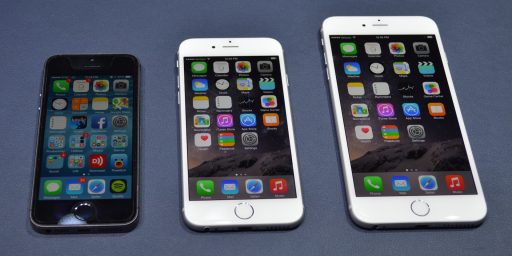APPLE MUSIC
After the recent discussions of the evils of digital music piracy, this story struck me as interesting: Apple Launches Paid Music Service. I saw mention of it earlier today and heard a little about it on NPR on the drive home from work. I think the idea makes sense–making digital music available legal and convenient. But there are a whole host of problems with the concept as currently executed and this venture in particular. The Apple service is just idiotic, as it currently works only with Macintosh computers! They might as well offer all forms of music except pop, rock, country, rap, and classical. Plus, in typical Apple fashion, they are grossly overcharging. A big lure of digital music for me, aside from the free aspect, is the ability to sample music that I haven’t heard on the radio and wouldn’t buy to see if I like it. At 99 cents a song, that’s not happening. Indeed, that price is too high anyway. It’s not much cheaper than the per song cost of commerical CDs right now, and they don’t have to ship it, package it, print labels, provide jacket art, a jewel case or, indeed, even the CD. If it was something like 15-20 cents a song, it would be much more likely to be a success.





Well, I don’t know if owning an Apple is necessarily a drawback… ;-P
But anyway, in addition to the things you’ve just mentioned, there are some other flaws about the plan including the fact that the music files are a special file type called AAC. These are not mp3s and from what I understand, an AAC to mp3 conversion would make the file quality degrade because the AAC format is lossy.
In addition, Apple is exericizing a type of Digital Rights Management (DRM) because you have to change your playlist after every 10 plays and you may share (stream) the music with 3 other Macs.
Here is a good discussion about it.
I really liked Abbey Road. Oh, wait…wrong apple…from the wrong lemon. Oops.
I don’t buy a lot of CDs anymore, but I do sometimes want a single song. Usually, it’s an old one. About a buck is the value I put on such a service when Napster folded. So about a buck sounds okay to me.
Prices, in real terms, usually fall over time (except for monopoly-controlled items, e.g., cable television and possibly Windows upgrades). So I anticipate the prices may fall as people sign up. But this is Apple, and some have called them a monopoly in their own space — so your guess is as good as mine.
Dan
P.S. Happy trimester blogoversary!
When I was discussing similar ideas with folks around the office a few years ago, $.50 was the typical cutoff point. People will blow $.50 on a song; while it’s only perhaps 50% cheaper than a CD, CDs don’t necessarily have 10 songs you’d want to listen to. The advantage of only buying songs you’d listen to outweighs the “cost”, and $.50 isn’t a lot of money these days. (I own a rather largish CD collection; you may feel differently if you don’t have so many CDs.)
The other requirement was that the songs be compressed losslessly. While MP3 and AAC usually sound OK, they aren’t perfect–and certainly if I’m going to pay for music I would reasonably insist on at least CD quality. These days I keep all my CDs stored on a fileserver–compressed with flac, so the audio quality is exactly the same.
It’s natural that Apple would make it Apple-only. They’re desperately trying to draw new suckers into the Apple market. Apples are fine machines, but I have 10 standard IBM-clone machines here and the last thing I need is stupidly unique hardware. (I got rid of all my “weird” boxes years ago and am much happier for it.)
Oh well. Another decent enterprise screwed by desperately greedy individuals.